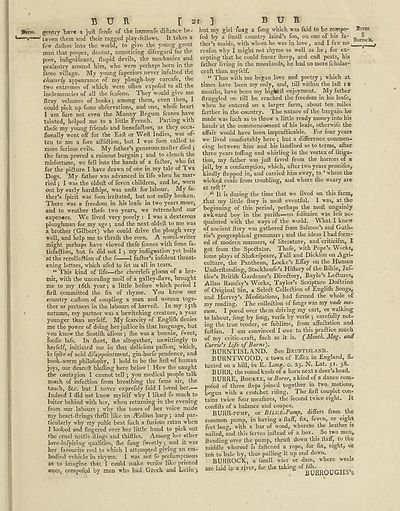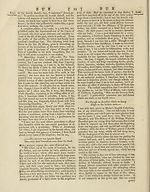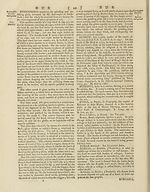Encyclopaedia Britannica, or, a Dictionary of arts, sciences, and miscellaneous literature : enlarged and improved. Illustrated with nearly six hundred engravings > Volume 5, BUR-CHI
(31) Page 21
Download files
Complete book:
Individual page:
Thumbnail gallery: Grid view | List view

BUR [
Ism?, gentry Tiave a juft fenfe of the immenfe diflance be-
' tween them and their ragged play-fellows. It takes a
few dafhes into the world, to give the young great
man that proper, decent, unnoticing difregard for the
poor, infignificant, ilupid devils, the mechanics and
peafantry around him, who were perhaps born in the
fame village. My young fuperiors never infulted the
clouterly appearance of my plough-boy carcafe, the
two extremes of which were often expofed to all the
inclemencies of all the fcafons. I hey would give me
ftray volumes of books j among them, even then, I
could pick up fome obfervations, and one, whofe heart
I am fure not even the Munny Begum feenes have
tainted, helped me to a little French. Parting with
thefe my young friends and benefaftors, as they occa-
fionally went off for the Fall or Weft Indies, was of¬
ten to me a fore affliftion, but I was foon called to
more ferious evils. My father’s generous matter died j
the farm proved a ruinous burgain j and to clench the
misfortune, we fell into the hands of a fadlor, who fat
for the pifture I have drawn of one in my tale of T wa
Dogs. My father was advanced in life when he mar¬
ried ; I was the eldeft of feven children, and he, worn
out by early hardftiips, wras unfit for labour. My fa¬
ther’s fpirit wras foon irritated, but not eafily broken.
There wras a freedom in his leafe in two years more,
and to weather thefe two years, we retrenched omr
expen«es. We lived very poorly : I was a dexterous
ploughman for my age •, and the next oldeft to me was
a brother (Gilbert) who could drive the plough very
well, and help me to thrafh the corn. A novel-writer
might perhaps have viewed thefe feenes with fome fa-
tisfadlion, but fo did not I j my indignation yet boils
at the reeolleftion of the f 1 fa£lor’s infolent threat¬
ening letters, which ufed to let us all in tears.
“ This kind of life.—the cheerlefs gloom of a her¬
mit, with the unceafing moil of a galley-flave, brought
me to my 16th year; a little before rvhich period I
firft committed the fin of rhyme. You know our
country cuftom of coupling a man and woman toge¬
ther as partners in the labours of harveft. In my 15th
autumn, my partner was a bevdtehing creature, a year
younger than myfelf. My fcarcity of Englilh denies
me the power of doing her juftice in that language, but
you know the Scotilh idiom ; Ihe was a bonnie, fweet,
lonfie lafs. In Ihort, Ihe altogether, unwittingly to
herfelf, initiated me in that delicious paflion, which,
in fpite of acid difappointment, gin-horfe prudence, and
book-worm philofophy, I hold to be the firft -of human
joys, our deareft bleffmg here below ! How Ihe caught
the contagion I cannot tell ; you medical people talk
much of infedlion from breathing the fame air, the
touch, &c. but I never exprefsly faid I loved her.—
Indeed I did net know myfelf why I liked fo much to
loiter behind with her, when returning in the evening
from our labours ; why the tones of her voice made
my heart-ftrings thrill like an ALolian harp ; and par¬
ticularly why my pulfe beat fuch a furious ratan when
I looked and fingered over her little hand to pick out
the cruel nettle-ftings and thiftles. Among her ether
love-infpiring qualities, {he fung fweetly; and it was
her favourite reel to vdiich I attempted giving an em¬
bodied vehicle in rhyme. I was not fo prefumptuous
as to imagine that I could make verfes like printed
cues, compofed by men who had Greek and Latin ;
21 ] BUR
but my girl fuag a fong which was faid to be compo¬
fed by a fmall country laird’s fon, on one of his fa¬
ther’s maids, w ith whom he was in love, and I faw no
reafon why I might not rhyme as well as he; for ex¬
cepting that he could fmear Iheep, and caft peats, his
father living in the moorlands, he had no more fcholar-
craft than myfelf.
“ Thus w ith me began love and poetry ; which at
times have been my only, and, till within the laft 12
months, have been my hig'beft enjoyment. . My father
ftruggled on till he reached the freedom in his leafe,
when he entered on a larger farm, about ten miles
farther in the country. The nature of the bargain he
made was fuch as to throw' a little ready money into his
hands at the commencement of his leafe, otherw ife the
affair would have been imprafticable. For four years
we lived comfortably here ; but a difference commen¬
cing between him and his landlord as to terms, after
three years tofling and whirling in the vortex of litiga¬
tion, my father was juft faved from the horrors of a
jail, by a confumption, which, after tw'o years promifes,
kindly ftepped in, and carried him away, to ‘ w here the
wicked ceafe from troubling, and where the weary are
at ryft !’
/'• It is during the time that we lived on this farmr
F^at my little ftory is moft eventful. I was, at the
beginning of this period, perhaps the moft ungainly
awkw'ard boy in the parilh—no folitaire was lefs ac¬
quainted with the w’ays of the world. What I knew
of ancient ftory was gathered from Salmon’s and Guth¬
rie’s geographical grammars ; and the ideas I had form¬
ed of modern manners, of literature, and criticifm, I
got from the Spectator. Thefe, with Pope’s Works,
fome plays of Shakefpeare, Tull and Dicklon on Agri¬
culture, the Pantheon, Locke’s Effay on the Human
Underftanding, Stackhoufe’s Hiftory of the Bible, Juf-
tice’s Britilh Gardener’s Diredtory, Bayle’s Lectures,
Allan Ramfay’s Works, Taylor’s Scripture Doarine
of Original Sin, a Selea Colleaion of Englifti Songs,
and Hervey’s Meditations, had formed the whole of
my reading. The colleaion of fongs was my vcide me-
cum. I pored over them driving my cart, or w'alking
to labour, fong by fong, verfe by verfe ; carefully not¬
ing the true tender, or fublime, from affeaation and
fuftian. I am convinced I owe to this praaice much
of my critic-craft, fuch as it is. (Month. Mag. and
Currie's Life of Burns').
BURNTISLAND. See Bruntisland.
BURNT WOOD, a town of Effcx in England, ft-
tuated on a hill, in E. Long. o. 25. N. Lat. 51. 38.
BURR, the round knob of a horn next a deer’s head.
BURRE, Bouree, ov Boree, a kind of a dance com¬
pofed of three fteps joined together in two motions,
begun with a crotchet riling. Ihe firft couplet con¬
tains twice four meafures, the fecond twice eight. It
confifts of a balance and coupee.
BURR-pumf, or BI LG E-Pump, differs from the
common pump, in having a ftaff, fix, feven, or eight
feet long, with a bar of wood, whereto the leather is
nailed, and this ferves inftead of a box. . So two men,
Handing over the pump, thruft down this ftaff, to the
middle whereof is fattened a rope, for fix, eight, or
ten to hale by, thus pulling it up and down.
BURROCK, a fmall wier or dam, where weels
laid * a rivW' f°r U“ taUnS °f fuBROUGHS-s.
Sums
II
Burrock.
Ism?, gentry Tiave a juft fenfe of the immenfe diflance be-
' tween them and their ragged play-fellows. It takes a
few dafhes into the world, to give the young great
man that proper, decent, unnoticing difregard for the
poor, infignificant, ilupid devils, the mechanics and
peafantry around him, who were perhaps born in the
fame village. My young fuperiors never infulted the
clouterly appearance of my plough-boy carcafe, the
two extremes of which were often expofed to all the
inclemencies of all the fcafons. I hey would give me
ftray volumes of books j among them, even then, I
could pick up fome obfervations, and one, whofe heart
I am fure not even the Munny Begum feenes have
tainted, helped me to a little French. Parting with
thefe my young friends and benefaftors, as they occa-
fionally went off for the Fall or Weft Indies, was of¬
ten to me a fore affliftion, but I was foon called to
more ferious evils. My father’s generous matter died j
the farm proved a ruinous burgain j and to clench the
misfortune, we fell into the hands of a fadlor, who fat
for the pifture I have drawn of one in my tale of T wa
Dogs. My father was advanced in life when he mar¬
ried ; I was the eldeft of feven children, and he, worn
out by early hardftiips, wras unfit for labour. My fa¬
ther’s fpirit wras foon irritated, but not eafily broken.
There wras a freedom in his leafe in two years more,
and to weather thefe two years, we retrenched omr
expen«es. We lived very poorly : I was a dexterous
ploughman for my age •, and the next oldeft to me was
a brother (Gilbert) who could drive the plough very
well, and help me to thrafh the corn. A novel-writer
might perhaps have viewed thefe feenes with fome fa-
tisfadlion, but fo did not I j my indignation yet boils
at the reeolleftion of the f 1 fa£lor’s infolent threat¬
ening letters, which ufed to let us all in tears.
“ This kind of life.—the cheerlefs gloom of a her¬
mit, with the unceafing moil of a galley-flave, brought
me to my 16th year; a little before rvhich period I
firft committed the fin of rhyme. You know our
country cuftom of coupling a man and woman toge¬
ther as partners in the labours of harveft. In my 15th
autumn, my partner was a bevdtehing creature, a year
younger than myfelf. My fcarcity of Englilh denies
me the power of doing her juftice in that language, but
you know the Scotilh idiom ; Ihe was a bonnie, fweet,
lonfie lafs. In Ihort, Ihe altogether, unwittingly to
herfelf, initiated me in that delicious paflion, which,
in fpite of acid difappointment, gin-horfe prudence, and
book-worm philofophy, I hold to be the firft -of human
joys, our deareft bleffmg here below ! How Ihe caught
the contagion I cannot tell ; you medical people talk
much of infedlion from breathing the fame air, the
touch, &c. but I never exprefsly faid I loved her.—
Indeed I did net know myfelf why I liked fo much to
loiter behind with her, when returning in the evening
from our labours ; why the tones of her voice made
my heart-ftrings thrill like an ALolian harp ; and par¬
ticularly why my pulfe beat fuch a furious ratan when
I looked and fingered over her little hand to pick out
the cruel nettle-ftings and thiftles. Among her ether
love-infpiring qualities, {he fung fweetly; and it was
her favourite reel to vdiich I attempted giving an em¬
bodied vehicle in rhyme. I was not fo prefumptuous
as to imagine that I could make verfes like printed
cues, compofed by men who had Greek and Latin ;
21 ] BUR
but my girl fuag a fong which was faid to be compo¬
fed by a fmall country laird’s fon, on one of his fa¬
ther’s maids, w ith whom he was in love, and I faw no
reafon why I might not rhyme as well as he; for ex¬
cepting that he could fmear Iheep, and caft peats, his
father living in the moorlands, he had no more fcholar-
craft than myfelf.
“ Thus w ith me began love and poetry ; which at
times have been my only, and, till within the laft 12
months, have been my hig'beft enjoyment. . My father
ftruggled on till he reached the freedom in his leafe,
when he entered on a larger farm, about ten miles
farther in the country. The nature of the bargain he
made was fuch as to throw' a little ready money into his
hands at the commencement of his leafe, otherw ife the
affair would have been imprafticable. For four years
we lived comfortably here ; but a difference commen¬
cing between him and his landlord as to terms, after
three years tofling and whirling in the vortex of litiga¬
tion, my father was juft faved from the horrors of a
jail, by a confumption, which, after tw'o years promifes,
kindly ftepped in, and carried him away, to ‘ w here the
wicked ceafe from troubling, and where the weary are
at ryft !’
/'• It is during the time that we lived on this farmr
F^at my little ftory is moft eventful. I was, at the
beginning of this period, perhaps the moft ungainly
awkw'ard boy in the parilh—no folitaire was lefs ac¬
quainted with the w’ays of the world. What I knew
of ancient ftory was gathered from Salmon’s and Guth¬
rie’s geographical grammars ; and the ideas I had form¬
ed of modern manners, of literature, and criticifm, I
got from the Spectator. Thefe, with Pope’s Works,
fome plays of Shakefpeare, Tull and Dicklon on Agri¬
culture, the Pantheon, Locke’s Effay on the Human
Underftanding, Stackhoufe’s Hiftory of the Bible, Juf-
tice’s Britilh Gardener’s Diredtory, Bayle’s Lectures,
Allan Ramfay’s Works, Taylor’s Scripture Doarine
of Original Sin, a Selea Colleaion of Englifti Songs,
and Hervey’s Meditations, had formed the whole of
my reading. The colleaion of fongs was my vcide me-
cum. I pored over them driving my cart, or w'alking
to labour, fong by fong, verfe by verfe ; carefully not¬
ing the true tender, or fublime, from affeaation and
fuftian. I am convinced I owe to this praaice much
of my critic-craft, fuch as it is. (Month. Mag. and
Currie's Life of Burns').
BURNTISLAND. See Bruntisland.
BURNT WOOD, a town of Effcx in England, ft-
tuated on a hill, in E. Long. o. 25. N. Lat. 51. 38.
BURR, the round knob of a horn next a deer’s head.
BURRE, Bouree, ov Boree, a kind of a dance com¬
pofed of three fteps joined together in two motions,
begun with a crotchet riling. Ihe firft couplet con¬
tains twice four meafures, the fecond twice eight. It
confifts of a balance and coupee.
BURR-pumf, or BI LG E-Pump, differs from the
common pump, in having a ftaff, fix, feven, or eight
feet long, with a bar of wood, whereto the leather is
nailed, and this ferves inftead of a box. . So two men,
Handing over the pump, thruft down this ftaff, to the
middle whereof is fattened a rope, for fix, eight, or
ten to hale by, thus pulling it up and down.
BURROCK, a fmall wier or dam, where weels
laid * a rivW' f°r U“ taUnS °f fuBROUGHS-s.
Sums
II
Burrock.
Set display mode to:
![]() Universal Viewer |
Universal Viewer | ![]() Mirador |
Large image | Transcription
Mirador |
Large image | Transcription
Images and transcriptions on this page, including medium image downloads, may be used under the Creative Commons Attribution 4.0 International Licence unless otherwise stated. ![]()
| Permanent URL | https://digital.nls.uk/192984672 |
|---|
| Attribution and copyright: |
|
|---|
| Description | Ten editions of 'Encyclopaedia Britannica', issued from 1768-1903, in 231 volumes. Originally issued in 100 weekly parts (3 volumes) between 1768 and 1771 by publishers: Colin Macfarquhar and Andrew Bell (Edinburgh); editor: William Smellie: engraver: Andrew Bell. Expanded editions in the 19th century featured more volumes and contributions from leading experts in their fields. Managed and published in Edinburgh up to the 9th edition (25 volumes, from 1875-1889); the 10th edition (1902-1903) re-issued the 9th edition, with 11 supplementary volumes. |
|---|---|
| Additional NLS resources: |
|

